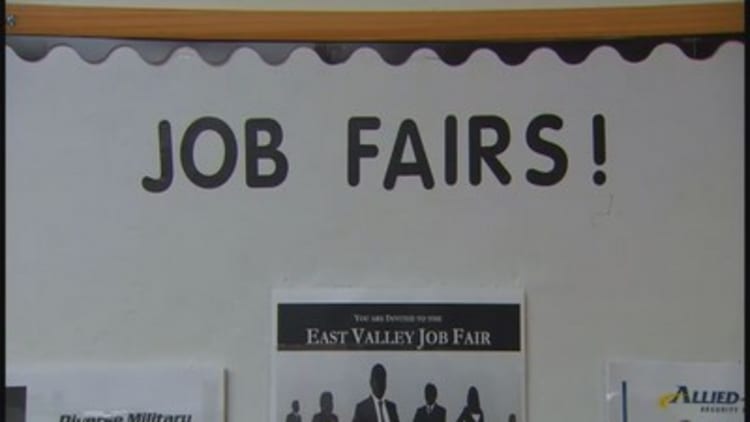
When Lynda Arratoon was laid off from her job as a certified management accountant in early 2012, she assumed that another job was around the corner.
She had never struggled to find jobs before, and she had plenty of experience. What Arratoon didn't count on was that in the five years that she had spent at snack firm Pepperidge Farm, the labor market had changed, particularly for older workers.
Now 59, the Norwalk, Connecticut, resident still hasn't landed a position.
"I didn't even consider the age aspect," Arratoon said. "But as I started to interview for jobs, that was the first time I realized that I was considered old."
Read More7 easy steps to retirement
Arratoon faces a dilemma. She isn't ready to retire either financially or mentally, but she can't seem to get hired, either, even as the labor market improves.
For now, Arratoon and her husband, a technician with the Federal Aviation Administration and a member of the U.S. Air National Guard, are getting by. But they need additional income in order to continue building their retirement nest egg if they hope to make the retirement math work in their favor.
Longer unemployment
To be sure, older workers fared better during the Great Recession than those in other age groups. Millennials, who were just entering the workforce when the economy turned sour in 2009, were hit the worst.
But when older workers lost their jobs, it took them about twice as long to find new ones, according to think tank the Urban Institute.
Steep pay cuts often accompany the new jobs, with workers age 51 to 62 taking a 20 percent cut and those 62 and older experiencing a cut of more than a third, according to the Urban Institute.
"When you get a new job, everyone is starting from zero," said Matthew Rutledge, a research economist at the Center for Retirement Research at Boston College. "But older workers have been earning raises and cost-of-living adjustments for a longer time, so they're earning more."
What is worse than having to take a pay cut, older workers say, is that they aren't even considered in the first place.
Employers seem to have sneaky ways of screening out older workers before they can even get a foot in the door.
"A lot of the online applications I fill out ask me what year I graduated from high school," Arratoon said. "And you can't get to the next screen unless you answer that question."
Arratoon isn't imagining things, said Sara Rix, a senior strategic policy advisor with the AARP Public Policy Institute.
Read MoreUp your Social Security savvy
"Age discrimination is a factor that is a barrier to older worker employment," Rix said. "So are employer concerns about technology competence."
Knowing this, Arratoon has worked to update her technical skills.
Through her volunteer work, she has taken on the updating of a nonprofit organization's website. Arratoon has also adjusted her salary and position expectations.
There is nothing new about the predicament, said Richard Johnson, director of the program on retirement policy at the Urban Institute.

Older workers have always had a harder time finding jobs following a layoff, he said.
What is different is that workers expect to stay on the job longer than ever before.
Over the past two decades, there has been a steady rise of workers over age 65. The demise of traditional pensions, fewer employers offering retiree health benefits and longer life spans mean that many workers must put in more years before they retire.
"In the past, when people over 65 lost their jobs, they were most likely to drop out of the labor force," Johnson said. "What was kind of unique about this recession was that workers over 65 still kept looking, and that's probably a pattern that we will likely see more of going forward."
New approach
Adding to the sting of unemployment is the fact that the job-seeking process itself has changed.
"Companies are no longer posting jobs, waiting for people to apply, interviewing and hiring," said career coach Marc Miller of Career Pivot. "What they're doing now is sourcing what we refer to as passive candidates."
Companies are hiring people who are known to them, who can help solve a particular problem or to work on a specific project.
Job seekers must use social media to network with employees of companies where they would like to work, Miller said.
Read MoreGen Xers seek 'livable' lives
"The biggest challenge for older workers is understanding this new way to work."
Part-time work is most likely to become more prevalent among older workers.
"I hear older workers say to me, 'I need my last job, and I need it for 10 years,'" Miller said. "Sorry, but no one is going to hire you for 10 years."
Rutledge at the Center for Retirement Research agrees.
"Anytime you have an opportunity to work as a contractor and can prove yourself, you should take it," he said.
Figuring out finances
The most immediate impact of a job loss is, of course, on day-to-day spending.
But people often wait too long to make adjustments to their spending, said Charles Conrad, senior financial planner at Szarka Financial.
"People want to stay comfortable after a job loss," he said. "I don't want them to be comfortable."
Conrad cautions against withdrawals from retirement funds as long as possible because they are too hard to make up.
You're going to get a Social Security check no matter what. Wouldn't you rather get a bigger one?Matthew Rutledgeresearch economist at Boston College's Center for Retirement Research
However, if the choice is between that and starting Social Security earlier, it might be best to use the retirement funds to allow benefits to accrue. Between ages 62, when people are first eligible to tap Social Security, and 70, benefits increase by about 7 percent a year, in addition to the cost-of-living adjustments.
Retirement investments may not get that kind of return, Rutledge at the Center for Retirement Research said.
And even if they do, the performance is by no means risk-free the way that Social Security is for individuals.
"You're going to get a Social Security check no matter what," Rutledge said. "Wouldn't you rather get a bigger one?"




